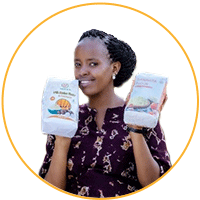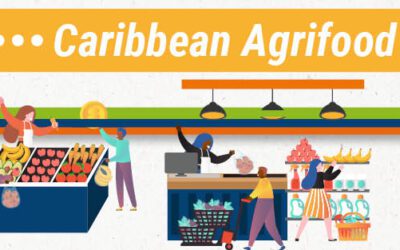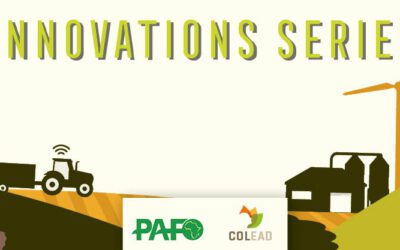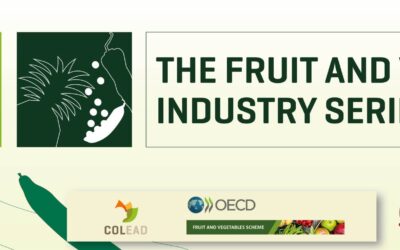Financing Caribbean agrifood entrepreneurs: strategies to access investment
Innovations Session N°5
July 22, 2021
The recording of the session is available in English and French on YouTube
The key role of MSMEs and businesses in producing nutritious food
Making nutritious and safe foods available, accessible, affordable, and desirable for improved nutrition requires action from all stakeholders in the food system, including producers, processors, retailers, and consumers, in both private and public institutions.
Local MSMEs and businesses have a key role to play as they provide most of the food consumed in Africa. They play a key role on the supply chain in domestic markets, generate jobs and income, especially amongst youth, are closely linked to producers and rural areas, know the food preferences of their clients and are rapid adopters of technologies and innovations. SMEs and businesses also serve institutional markets, such as government feeding programs and humanitarian agencies.
However, MSMEs struggle to make nutritious foods affordable to poor consumers in an economically viable manner, due to the high production costs involved. To address a severe impact on the availability of nutritious foods, food insecurity, and hunger in the aftermath of the COVID-19 pandemic, increased support will be needed to improve domestic value chain resiliency, enhance value chain coordination, and foster innovation. This chain is dominated by smallholder farmers and small to medium traders and wholesalers, who transport produce from rural production zones to urban web markets through a web of small to medium-scale traders.
Studies by the Global Alliance for Improved Nutrition (GAIN) recommend a more supportive tax system for MSMEs that produce nutritious food; agricultural policies that support the production of more diverse and nutrient-rich foods; stimulating technology and innovation adapted to the scale of SMEs and transfer of technologies; reducing administrative barriers for MSMEs and facilitate essential business procedures, access to necessary inputs such as credit, infrastructure and energy.
MSMEs should be included in any public- or private-sector efforts to increase the availability, accessibility, and affordability of nutritious foods in Africa. MSMEs are the missing middle in accessing funds and investments as they are too big for micro-finance and too small for commercial lending. Therefore, efforts to increase available financing for nutritious foods producing MSMEs in Africa and other low-income regions is essential to strengthen food value chains and increase the supply of nutritious foods. Private capital – particularly blended finance – has considerable potential to fill the financing gap to unlock more investment in and technical support to MSMEs working in nutritious food value chains.
Agri-food exports from Africa to the European Union are key development enablers through job creation and increased revenues, especially among groups such as youth and rural women. But as importantly contribute to improved food security, nutrition and food safety thanks to the dissemination of knowledge and know-how on aspects such as sanitary and phytosanitary compliance, social empowerment and environmental protection, so that skills and technologies adopted for export markets also benefit production and thus consumption on dynamic local and regional markets.
Key points for discussion on transitioning to nutritious food
- How African MSMEs and farmers organisations can increase production and marketing of nutritious food in a profitable way?
- What obstacles do they face? What support do they need?
- What incentives can be provided to MSMEs and smallholders to transition towards more healthy and nutritious food and what investments from the public and private sector can accelerate this transition?
Session Region
Networking
Join our Forum to discuss and explore how to encourage innovations across agricultural value chains to transform food systems in African, Caribbean and Pacific countries and beyond, promote sustainable agriculture & leverage investments. Share insights, ask questions, and collaborate on innovative solutions for a greener future.

Dr. Aggrey AGUMYA
Director for Research and Innovation, Forum for Agricultural Research in Africa (FARA)
Aggrey Agumya is the Director for Research and Innovation-designate for the Forum for Agricultural Research in Africa (FARA) since 1...

David Foli AYIVOR
Founder and CEO, AGROMYX, Ghana
David is the founder and CEO of Agromyx Company and has been working in the food industry for the past...

Fatma BEN REJEB
CEO, Pan-African Farmers Organization (PAFO)
Fatma has been working with farmers’ organisations for more than 20 years. She began her involvement in land and legal...

Isolina BOTO
Head of Networks and Alliances, COLEAD
Isolina is the Head of Networks and Alliances at COLEAD, a non-profit Association of private sector operators in the agrifood...

Dr. Lawrence HADDAD
Executive Director, Global Alliance for Improved Nutrition (GAIN)
Lawrence Haddad is GAIN’s Executive Director since 2016. He also chairs Action Track 1 of the UN Food Systems Summit...

Courage HODEY
Financial Manager, Maphlix Trust Ghana Limited, Ghana
Courage is the Financial Manager of Maphlix Trust Ghana Limited and a finance and business development strategist with experience in...

Jolenta JOSEPH
Founder and CEO, Sanavita, Tanzania
Jolenta Joseph is a young nutritionist, food entrepreneur and agri-food processing trainer in Tanzania. She has made remarkable progress in...

Jeremy KNOPS
General Delegate, COLEAD
Jeremy holds a Master’s degree in Business Engineering from the Solvay Brussels School of Economics and Management (SBS-EM). Prior to...

Marie Ange MUKAGAHIMA
Founder and CEO, Zima Enterprise, Rwanda
Marie Ange is the Founder and Managing Director of Zima Enterprise, a company which adds value to pumpkin and pumpkin...

Oluwaseun SANGOLEYE
Founder and CEO, Baby Grubz, Nigeria
Seun is an experienced nutrition educator, international speaker and multiple award winning entrepreneur. She is a manufacturer of packaged infant...
English
In English
Français
In French
Recent Sessions
PAFO-COLEAD Innovations session N°26
Financing African Agrifood Entrepreneurs: Strategies to access investment
Fruit and Vegetables Industry Series N°12
Navigating EU policies, regulations and standards impacting fruit and vegetable value chains



